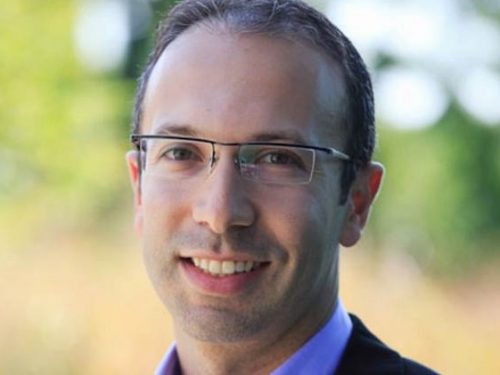Joe Hyams, CEO of HonestReporting, not only thinks reporting of Israel is woefully biased, he believes its his life mission to correct media exaggeration, distortion and outright half-truths.

We were fortunate to sit down (we were mostly sitting, with the majority of us in the U.S. and him in Israel) with their CEO, Joe Hyams, to get the scoop on anti-Israel media bias and what can be done about it. Here are the top highlights from his engaging session, which was live from Jerusalem:
MY SABABA USER QUESTION: How did you become involved with HonestReporting?
JOE HYAMS: I often wonder the same thing! Seriously though, I come from a marketing and advertising background, and found myself assigned to various clients in Israel around the year 2000. In the years following, I became fascinated by the perceptual gap between what Israel was, and what the world believed her to be. I had a conscience perhaps, and knowing how communication can manipulate people’s thoughts and feelings (about what to buy, what to like…) I couldn’t ignore the same being used by some to disenfranchise Israel and her citizens. Most of all I saw a gap in people’s own awareness as news consumers of the effects of bias on their own identity and affinity for Israel. It was unfair, and I was fortunate to meet this incredible opportunity to take my professional experience and turn it, I hope, into something positive for the wider community. I believe that good journalism serves more than just Israel, and that begins with informing the grassroots and calling the media to account. That’s how I got into this, 11 years ago this month!
Q: Do you think anti-Israel bias is conscious? if it is, do you think editors care that their reporters aren’t being objective?
Hyams: If you are a news reporter tasked with bringing an unfiltered report, you may or may not be aware of those biases impacting your work. Regardless, you are bound as a professional to be on guard and be open to critique. That’s why we are here, around the clock keeping watch. I should also note that bias at times is a meta-outcome of several stories, reporters or even news outlets. For example, the horrendous terror attacks in Europe last week when compared/contrasted with attacks in Israel made for a very unbalanced ‘big picture’. The bias on the broader scale or over time requires serious investment to track and identify the inconsistencies in media behavior.

Q: Is it the columnists or the editors at fault?
Hyams: Columnists by definition are publishing their opinions and, while we can still hold them to account for inaccuracies or demonizing Israel, ultimately it is clear that these are opinions and not necessarily facts. Many news outlets are mirrors of the editors in charge. So it’s their decisions to publish anti-Isarel columnists and it’s their decisions as to what stories to publish. We’ve seen plenty of times where it is apparent that the journalists on the ground in Israel aren’t necessarily unprofessional or anti-Israel but their newspapers display a level of antagonism towards Israel that comes directly from the editorial team in head office.
Q: Why do media sites actually make changes based on your investigations? What encourages them to listen to you?
Hyams: Good Question. Media outlets still want to be seen to be doing a professional job and we’ve prompted countless numbers of corrections over the years. Reputation is the currency on which media trade, and calling credibility to account warrants a response. Most professionals are comfortable making change when called out. Plus, it isn’t just HonestReporting that is forcing the media to listen. It’s the thousands of regular media consumers who send their complaints and write letters to the editors based on our analyses of media bias. That’s why savvy news consumers are key to raising industry standards.
Q: Which media sites are the worst offenders?
Hyams: We concentrate on mainstream media as these are the outlets that have the most widespread reach and influence. Every year we produce the Dishonest Reporter of the Year Award, the most recent winner being the BBC for a number of particularly shocking anti-Israel incidents during 2015. Other winners over the years have included the New York Times. Generally, we’ve found that the British press is worse than the US press. The Guardian and Independent spring to mind.
Q: How much did you think these headlines and stories are anti-Semitic and how much are they just business as usual for media?
Hyams: While there is anti-Semitism out there, it’s far too simplistic to claim that this is the driving force behind the coverage. Most bad coverage is down to a mixture of ignorance and the inability of the journalists to see beyond the narrow framing of the issue that they have been brought up with. Too often, everything that goes on here is viewed through a prism of black and white with no shades of grey whereby Israel is the aggressor and the Palestinians are the victims. Unfortunately, even if the intent is not anti-Semitic, it can sometimes trigger anti-Semitic sentiments.
Q: Are “Conservative” US papers better as far as Israel bias goes?
Hyams: Unfortunately, most of the problems Israel is facing in the media today come from liberals and left-wingers. Given that Israel has a record in areas such as women’s rights, gay rights, minority rights, press freedom and democracy that compares favorably to most Western nations, this shouldn’t have to be the case. But yes, conservative papers are generally better on Israel or at least express a greater understanding of Israel’s security dilemmas.
Q: What are some trigger words or phrases that indicate bias? Anything particular to look out for?
Hyams: Love this question as it touches on the very important issue of language in news coverage. Phrases like “Palestinian eyewitnesses said…” should ring alarm bells as to the accuracy of what is being told. Look out for technical words thrown around without any context. For example, Israel is often accused of being “disproportionate” without giving any explanation about what that really means under the accepted laws of war. Likewise claiming that settlements are a breach of international law is technically inaccurate. There is one school of thought that interprets international law in this way but there is also a competing narrative.
Other phrases could be “Occupied Territories” instead of “disputed territories.” Also calling the IDF “Israeli Occupation Forces” comes straight out of the Palestinian lexicon.
_ _ _
There’s much more… Want more info? Read the full AMA here. Visit HonestReporting here. Find out how you can be informed of MySababa AMAs first by emailing at israel360@cjp.org.
This post has been contributed by a third party. The opinions, facts and any media content are presented solely by the author, and JewishBoston assumes no responsibility for them. Want to add your voice to the conversation? Publish your own post here. MORE

